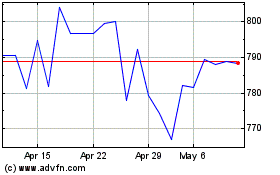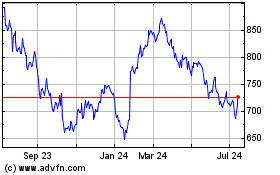By Saabira Chaudhuri
Several years ago, Patty Anagostis gave away all her Burberry
handbags.
The 55-year-old Summit, N.J., resident, whose collection of 100
handbags includes numerous Louis Vuitton and Chanel satchels, said
she used to like Burberry but now finds the brand "dated."
"They need to revamp their image," she said of Burberry. "Chanel
is so classic, it never goes out of style."
Burberry Group PLC agrees that it needs to move its brand higher
up the luxury scale, chasing rivals such as Chanel SA, LVMH Moët
Hennessy Louis Vuitton SE and Hermès International SCA in the
crucial U.S. market.
Burberry Chief Executive Christopher Bailey is under pressure to
find growth in the U.S., among other markets, as he tries to offset
a sharp drop in sales in Hong Kong where Burberry has more stores
than many of its rivals.
But the company faces a sticky problem in the U.S.: controlling
its brand. Burberry is more reliant on wholesale agreements with
large department stores to sell its products in the U.S. than
anywhere else in the world, leaving it vulnerable to markdowns and
product positioning that doesn't always fit with its goal of
pushing the brand upmarket. In fiscal 2015, the company reported
35% of its Americas revenue came from wholesalers, compared with
26% globally.
"The stronger your brand, the more you can say to the department
store, 'Buddy, I manage things directly or forget it,'" said
Bernstein luxury analyst Mario Ortelli. Burberry's wholesale
relationships in the U.S. are "indicative of the relative weakness
of Burberry compared with other brands."
In a bid to wield more control, Burberry has been walking away
from some U.S. department-store agreements and reining in
distribution.
The company terminated three menswear deals with Nordstrom Inc.,
in fiscal 2015, which ended March 31 last year, according to a
person familiar with the moves. Burberry also has ended agreements
on certain product lines at Saks Fifth Avenue, a unit of Hudson's
Bay Co., and Bloomingdale's, owned by Macy's Inc., the person said.
It continues to sell clothing and accessories at all three.
Nordstrom, Saks and Bloomingdale's declined to comment.
"Burberry has a very good relationship with all of its wholesale
partners in the U.S. and has been working closely with them to
elevate the brand in this key market," said a Burberry
spokesman.
On a conference call last year, Chief Financial Officer Carol
Fairweather said Burberry's selective termination of
department-store placements is "very much part of our strategy" to
elevate the brand and move away from deals "that aren't so
brand-appropriate."
In April, the London-based company's shares plunged after it
said fiscal 2017 wholesale revenue would be 10% lower than the
prior year's levels. The forecast decline is largely due to slower
demand from U.S. department stores, which have seen tourist
spending squeezed by a stronger dollar while domestic shoppers
spend more money on home improvements and dining out and less on
clothes, according to research firm IHS Global Insight.
Despite the slump, Burberry said it plans to push fewer products
on department stores as part of its overarching effort to burnish
the brand. Burberry formerly urged U.S. department stores to boost
wholesale orders, but now "we would just much rather they bought
what they think they can sell at full price rather than having to
put it into markdown," said Fay Dodds, vice president of Burberry's
investor relations, in April.
The company runs concessions -- leased areas that it fully
controls -- at department stores such as Harrods and Selfridges in
the U.K., but it has just one concession in the U.S., at Macy's in
Manhattan.
"Moving to a concession agreement isn't easy if you don't have
strong bargaining power, since clearly the wholesale customers
would prefer to have you on a wholesale basis," said Exane BNP
Paribas analyst Luca Solca.
Burberry has been trying to strike more so-called shop-in-shop
deals -- ones that fall short of concession agreements but through
which Burberry has more control than in a simple wholesale
deal.
Ms. Dodds in July said Burberry is seeing "great growth where
we're getting dedicated shop-in-shops." The company didn't reveal
how many such agreements are in place.
Other luxury brands also have moved to slim down their wholesale
presence in the U.S.
"Our principal aim was to reduce the difference of our
presentation in the U.S. between us and the wholesaler," said Prada
SpA Chief Financial Officer Donatello Galli in December.
Gucci parent Kering SA also is taking a similar stance.
Its Chief Executive François-Henri Pinault said in February that
the fashion brand is "undertaking a major and continuous effort to
ensure true consistency between our stores and those of our
partners."
Burberry also has been shuffling its U.S. real estate of roughly
60 stores -- opening stores in more desirable locations in a bid to
attract more customers -- although the store count has stayed
roughly flat since 2011. The company is hiring in cities including
Miami, Dallas, San Diego and Boston to beef up its private-clients
team, which aims to turn big spenders into regular Burberry
shoppers by cultivating personal relationships and offering styling
services. Despite the mounting pressure on Mr. Bailey to deliver
strong sales growth, executives insist Burberry won't jeopardize
its prospects in the U.S. for a short-term boost to sales.
"We've been on this journey for the last few years but there is
still more to do," Ms. Fairweather said. "We are prepared to take
that lower growth to protect the brand long-term."
--Suzanne Kapner contributed to this article.
Write to Saabira Chaudhuri at saabira.chaudhuri@wsj.com
(END) Dow Jones Newswires
May 02, 2016 19:22 ET (23:22 GMT)
Copyright (c) 2016 Dow Jones & Company, Inc.
Lvmh Moet Hennessy Louis... (EU:MC)
Historical Stock Chart
From Apr 2024 to May 2024

Lvmh Moet Hennessy Louis... (EU:MC)
Historical Stock Chart
From May 2023 to May 2024
